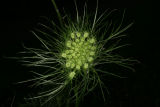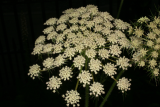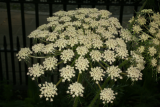Additional notes (click to expand)
Medicinal
Traditional Herbal Medicine Registration (THMR).
Nomenclature
Name not listed by RHS.
The Royal Horticultural Society Horticultural Database, available at www.rhs.org.uk www.rhs.org.uk
Other use
Just as today, certain foods are eaten and thought to be good for one, and even help one see in the dark (carrots, do contain vitamin A which is essential for night vision), I think it highly unlikely that carrots were ever grown to make medicines , only ever as a healthy foodstuff, as carrots do not appear in the 16th century pharmacopoeias (eg Pharmacopoeia Augustana 1564) or the popular 17th century ones (eg Culpeper's Complete Herbal). See Gerard's Herball (1633) '.. carrots are sowne in fields, and in gardens where other pot herbes [pot herbs are plants grown for cooking, eating] are: they require a loose and well manured soile' and he gives their uses as 'The root of the yellow carrot is most commonly boiled with fat flesh and eaten; ...' and goes on to say that carrots tend to make one have less flatus, and to pass more urine. Gerard says that the wild carrot has the properties attributed to it by Dioscorides - and the cultivated carrot has the same effects but is less powerful - but that the Daucus of Dioscorides may be parsnip rather than carrot. I think this likely to be incorrect as the first ever (existing) illustrated copy of Dioscorides Materia Medica (70AD), in the Juliana Anicia Codex (512 AD) has a perfectly recognizeable cultivated orange carrot for the plant discussed by Dioscorides (Book III, chapter 52 in that edition). Nevertheless, carrots (Daucus), Parsnips (Pastinaca), and even Cretan carrot (Athamanta cretensis) were perpetually confused in the medieval and post- medieval period. ** .
As for the question 'when were carrots cultivated?' the likelihood is that they have been cultivated for 2,000+ years , and there are Egyptian, Greek, Roman, and Afghanistan excavations that are said to attest to this. Even in Dioscorides' time, there was a distinction between wild and cultivated carrots, but that the main tenet of medicine then was that health is maintained, restored and achieved by the correct diet. Galen (200AD) is particularly keen on this theory, but Hippocrates (c.370BCE) was an early exponent.. Carrots were 'hot' plants according to Dioscorides - so good for exciting passion, conception, periods, and poisoning (poisoning resulted in the body becoming cold (dead), so poisons were thought to contain vast quantities of the 'cold humour', which a hot plant would counteract). If one cultivated wild carrots they would become cultivated carrots in the eyes of our ancestors, and so wild carrots would have been collected from the wild, and selected forms of orange cultivated carrots would have been grown - as a healthy food. To this day, in the 'muthi' (medicinal) plants in South Africa are held to be more efficacious when collected from the wild than the same plants grown agriculturally. ** .
So the answer to the question, 'did people (in Britain) ever grow carrots just for medicinal reasons' the answer has to be that throughout the old world (Eurasia) they were good for the diet, good for health, and like today, as 'one of your five a day'. For their Vitamin A and C. for fibre, calories, anti-oxidants etc they have been grown as a foodstuff which was good for health since earliest cultivation records began (although none of these elements would have been familiar to our predecessors). They have never been grown as a treatment for an illness.
Oakeley notes: May 2014
Daucus carota L. 'Black Knight'
Family: APIACEAEGenus: Daucus
Species: carota L.
Cultivar: 'Black Knight'
Common names: Wild Carrot 'Black Knight'
Distribution summary: N. Africa, W. Asia, Europe
Habit: Annual
Garden status: Not currently grown
Reason for growing: Medicinal, other use, toxic


